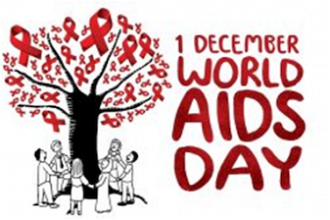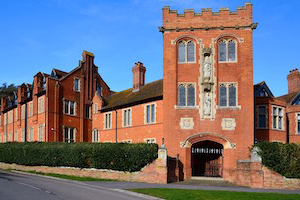Reflections from CAPS symposium: Making Faith Sense of HIV

Following the Making Faith Sense of HIV symposium held at Douai Abbey on 9 September, Jim McManus has written this summary of the talks.
On 9 September a group friends, advisers, professionals and volunteers, new and old, gathered at Douai Abbey for the second symposium this year to mark 21 years of the charity Catholics for Aids Prevention and Support (CAPS) and 20 years of their Christian HIV peer-support ministry, Positive Faith.
"Making Faith Sense of HIV" invited participants to reflect theologically on the meaning and significance of the Aids pandemic, and the response of the Church, over the past 40-plus years.
Among the HIV professionals attending were clinicians and the chief executive of the Terrence Higgins Trust. Five people, some of whom had been involved in Church ministry since the beginning of the HIV/Aids pandemic, and others who are more recently involved, gave presentations.
I was asked to listen to and summarise the themes raised during the day. No easy task since each of the five speakers was insightful and challenging, in different ways. It was like being given the task of summarising a living, rich, active and organic community of God's people: church.
Several core themes ran through the day which struck me very strongly, and I will try to summarise these. But the single consistent message was that CAPS seems to me to be a living exercise in Synodality.
We had some discussion after lunch about what the charism of CAPS may be. That is still a discussion in progress, but every time I meet with CAPS I come to a people, where everyone is a pilgrim in camino -- on the journey. CAPS provides a place of encounter with God and each other, where I always find deep listening and practical care. I find people who read the signs of the times, and who seek to respond, always faith-filled, always listening to the Spirit.
Lazarus Mungure, CAPS chairperson, started us off on the day with a welcome that, being Lazarus, was heartfelt and welcoming of everyone. He read us a poem, in which was written that the author, after his death, wanted people to "write me as one who loves their fellow". That one sentence almost sums up how CAPS and the people I encounter through it live. They love their fellow as Jesus did. And out of that introduction came five detailed and rich in person presentations and one video message of care, all covering different ground, but similar and consistent themes.
We started the day with Sr Gill, a Medical Missionary Sister, who spoke about how her ministry began during the first decades of the Aids pandemic. She lived amongst the 60,000 people in Korogocho, the poorest slum in Nairobi. There was no treatment. Extreme poverty created the conditions for widespread disease. The message was "Aids Kills" and fear gripped the population. Sr Gill offered training for members of the small base communities, already formed in the parishes. The magnitude of the pandemic required the mobilisation of lay volunteers to care for the sick and promote HIV prevention in the community. At a time when even doctors and nurses were afraid, their response was unequivocal: "We are Christians, it is our job, we will take care of them…we will look after them." And they have done so ever since, added Sr Gill.
Rooted in prayer and her congregation's charism, a hospice, various care initiatives, food supply and a child crisis centre developed. Sr Gill spoke movingly and deeply of practical encounters which listened and responded. Her talk drew us into practices of deep listening, countering fear, focused on welcome and respect. "All people asked for was moral support and encouragement" she said of the works which grew out of this encounter. She spoke of coming to a parish or a place "not to instruct but to find the wisdom that is already there".
Throughout her presentation spanning 40 years of experience, I got the sense of collaborative ministry which embodied the essence of a share in Christ's mission in the synodal style, while remaining evergreen, because this particularly Christian approach - from prayer comes encounter, listening and response - is still here now. "Do justice," she said. Words repeated by every speaker and almost every person who asked a question. We were off to a great start, and the other speakers did not disappoint.
CAPS' patron, Fr Timothy Radcliffe, OP, sent good wishes in his video message and spoke of the upcoming Synod as signifying a very important time for the Church. "[The synod] is about how we move beyond being what looks like sometimes a very priestly, hierarchical society, community, to being obviously a community of God's friends. And CAPS is dear to my heart because of the friendship it embodies."
Martin Pendergast came next, one of the founders of CAPS. Like an experienced guide charting the flow of a river, from Vatican II and the 1980 National Pastoral Congress he charted how CAPS was, like the Church, "a pilgrim people of God, journeying through history, proclaiming good news and liberation".
Both Martin, and CAPS' director Vincent Manning, who ably facilitated the symposium, reflected on the saying "The Body of Christ has Aids" - the body of Christ is living with HIV, and that means we need to discern how to respond. Although both Vincent and Martin have differing recollections of when that phrase was first used, the fact that both affirmed its importance, shows how different understandings of our history and tradition in the Church can lead to the same place of action and response.
The "community of friends" that have belonged to CAPS have read the signs of the times over the years, discerning together how God asks us to respond. As this ministry has grown so too its diversity and inclusion has grown. CAPS provides a model of how very different populations within the Church - Black women and men, gay men and more - can work together and welcome each other in community. In his impromptu reflections during speakers, Vincent reminded us that one of the strengths of CAPS is how people are accepted, just as they are. Many in dire poverty. People who struggle with stigma and rejection or feelings of shame. Many living with mental health issues, and those subjected to racism, homophobia and the injustices of our immigration system. All are welcomed as equals, invited to encounter each other as sisters and brothers in Christ.
A core sign of enduring ministry is practical service of one another. This means real, deep listening, and serving each other, including practically cooking and serving meals for each other. Some of the best CAPS listening happens around a meal table. At a time when some in Church and society seek to weaponise difference and intolerance, CAPS liberates listening and acceptance. As Martin and Vincent both said, finding and coming to know Christ in and through people with HIV gets to the centre of God's love for everyone and the Catechism's affirmation of dignity.
Our next speaker was a founding member of CAPS' Positive Faith peer support ministry. An experienced spiritual director, a gay man, married, and living with HIV. Some people in the Church have difficulty valuing all of that about him, he told us. In a profound and challenging presentation, he reminded us that who God calls and endows with the gifts or skills for mission and ministry is God's initiative, but "the Church has a problem with living its call to honour the image of God in everyone". We should not be "separating our identities into parts but coming to God as one person." He repeated the call of Pope Francis at World Youth Day: Todos, Todos, Todos: All are called.
But he pointed out that the word "everyone" is doing an immense amount of work here - there are real problems welcoming people when the institution struggles to honour the image of God in them. The trauma and hurt of people who are treated with insensitivity by a Church which claims "everyone" but doesn't yet practice it was all too real in the room. The issue of whether the Church really builds people for service and pilgrimage is another. He spoke of how the Church built him up as a child, and he experienced profound love, but not as an adult. He also spoke of people whose experience was "the Church never built me up". In that lack of building people up, the Church often traduced the Gospel. He raised the issue of universality against the backdrop of "everyone" - "maybe a universal church is not possible" he said, given these challenges. I was left thinking that Synodality could be an opportunity for multiple particular expressions of Church, where people can find welcome and growth and accompaniment, not just insensitivity. I was confronted by the fact that CAPS models such an expression. The institutional Church really needs to face the fact that sometimes in rejecting people it rejects gifts of the Spirit.
Alberto, a gay man living with HIV bearing the burdens of HIV stigma, then spoke of how his faith was both an intense source of pain and something which saved his life. Like the previous speaker Alberto spoke of how, despite the ways in which he had been mistreated by the Church, he could not let go of the faith. As Alberto put it, he could not let go of "the rich tapestry of values and traditions that have become a core part of my identity." The Catholic "both-and" - I am a gay man, I am living with HIV, I have had drug problems but am now recovering, AND I am a Catholic - weaved through his presentation in a way which reminded us that as Catholics the aspiration and the reality are things we should seek to hold together in tension.
Our final speaker was Abigail, who spoke about her husband and the "gruesome" final days of his journey in 1993 when he died from Aids. Her deep faith in coming to terms with this loss and her own HIV diagnosis, was evident. She spoke of the shock of losing her employment, managing health problems and her need to provide for her children. Like an expanded lectio divina, her talk was steeped in scripture. "If it had not been for the Lord on my side, I do not think I would be standing here today" she said. Abigail retold how reflecting on Numbers 21: 8 where the Lord told Moses to make a snake, put it on a pole and whoever looked at it would live, had helped her. Her HIV diagnosis was like a snake-bite, and the pole like the Cross of Jesus, upon which she had gazed. From prayer and scripture Abigail drew the strength to believe she would not die. Accepting her diagnosis and trusting in God made her turn to action, care and activism. Out of prayer comes witness and service and a struggle for justice - taking us full circle to Sr Gill's initial reflection. Abigail concluded by reminding us that John 3:14 -15 has Jesus tell us "Just as Moses lifted up the serpent in the wilderness, so must the Son of man be lifted up, that whoever believes in him may have eternal life."
The request to summarise the day gave me the opportunity to really listen to the speakers. As I listened, I found myself moved and challenged, sad and angry, inspired and shaken by each. "Making Faith Sense of HIV" was about modelling synodality: prayer, encounter, listening and doing justice.
This day taught me much, and I believe it has lessons for the wider Church as we strive to take up Pope Francis' invitation to be a synodal church. I have already mentioned CAPS being a place of encounter and deep listening - practices and values a synodal Church must take seriously. But there were other lessons too.
Each person who spoke that day, and the people who shared over coffee and lunch, and over quiet time in the Abbey, embodied 1 Peter 3:15 - they gave an account of the hope that was in them, sometimes against a backdrop of breath-taking hurt. What was clear was every speaker showed how out of a deep reflection on scripture and prayer and friendship with Christ came the call to action "Christ's love compels us" as Paul says (1 Cor 5:14.). Out of response to our call to holiness comes concern and action for God's creation.
It was fitting we were hosted by a Benedictine institution. As the Rule of Benedict (Chapter 53) exhorts us, the Christian understanding of Hospitality - welcoming others as we welcome Christ - ran throughout the day. Several of the speakers spoke of the welcoming love and hospitality of the Benedictines offered to CAPS members over the years. Another Benedictine theme was how CAPS manages to include without minimising, many different people, where they are. This strongly reminded me of Chapter 64 of Benedict's Rule where the role of an Abbot is to "so arrange everything that the strong have something to yearn for and the weak nothing to run from". Another lesson for a synodal Church, lived by the Benedictines and by CAPS both. Perhaps, I wondered, this is easier for the Church when it is being particular than the Church as institution being universal. Reflecting on Evangelii Gaudium, Fr Stefano Conotter recently described the "basic meaning of the synodal dynamic" as being "a Church that is not limited to exercising control over grace… but elicits in every way the positive response of those to whom Jesus offers His friendship." (Evangelii Gaudium, 27.)
At the first CAPS Symposium on 15 June this year in London, I was asked to reflect on the science of peer-support, the priority of CAPS' ministry, and its value. I said to people that every time I read a scientific paper on the impact of peer-support I am drawn to Matthew 5:13-14 where Jesus says we are to be the salt of the earth and the light of the world. There are things which peer support does which are like salt: hidden unless you know they are there, but vital. It can add flavour, provide salve and healing even as it stings, season things, lifts and allows the aroma and taste of other ingredients to come out and provide balance. There are things which peer support does which are like light: showing people how others live, providing a sense of warmth and welcome, guiding our path when all seems dark. Helping us to orient our way. When we face hatred or exclusion or hurt, we need salt and light. CAPS is such for many. The body of Christ is still living with HIV. Are we truly able as Church to allow that body to be salt and light to us?
LINK
CAPS: www.positivefaith.org.uk


















